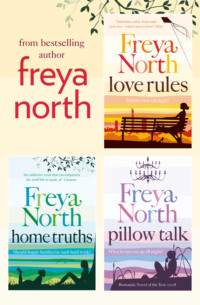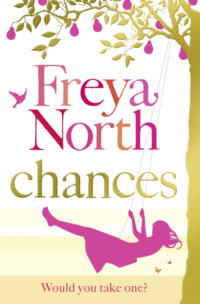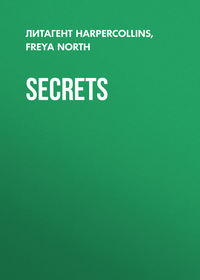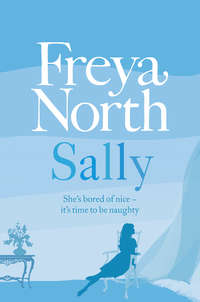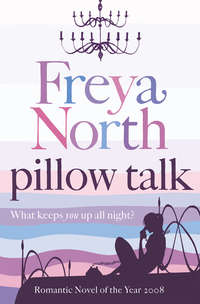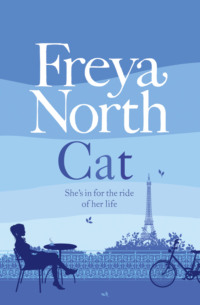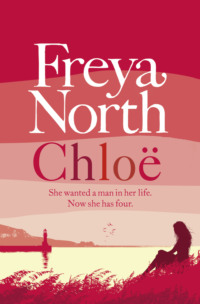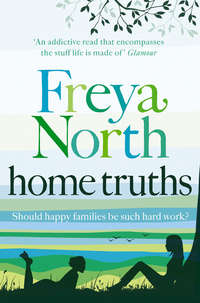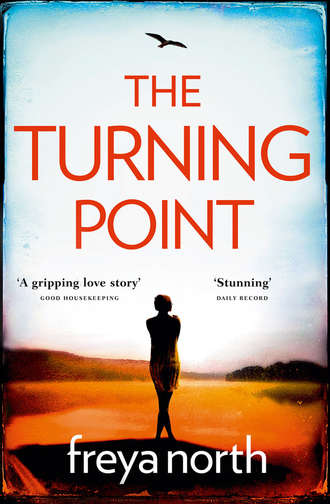
Полная версия
The Turning Point: A gripping emotional page-turner with a breathtaking twist

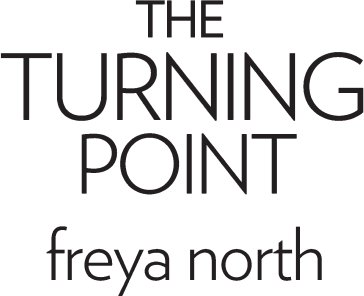

Copyright
Published by HarperCollinsPublishers Ltd 1 London Bridge Street London SE1 9GF
www.harpercollins.co.uk
First published in Great Britain by HarperCollinsPublishers 2015
Copyright © Freya North 2015
Cover layout design © HarperCollins Publishers 2016
Cover design by Heike Schüssler © HarperCollins Publishers Ltd 2016
Cover photographs © www.WMArtPhoto.se / Getty Images (woman); Kniel Synnatzschke / PlainPicture (background); Shutterstock.com (bird).
Freya North asserts the moral right to be identified as the author of this work.
A catalogue copy of this book is available from the British Library.
This novel is entirely a work of fiction. The names, characters and incidents portrayed in it are the work of the author’s imagination. Any resemblance to actual persons, living or dead, events or localities is entirely coincidental.
All rights reserved under International and Pan-American Copyright Conventions. By payment of the required fees, you have been granted the non-exclusive, non-transferable right to access and read the text of this e-book on screen. No part of this text may be reproduced, transmitted, down-loaded, decompiled, reverse engineered, or stored in or introduced into any information storage and retrieval system, in any form or by any means, whether electronic or mechanical, now known or hereinafter invented, without the express written permission of HarperCollins.
Source ISBN: 9780007462308
Ebook Edition © March 2016 ISBN: 9780007326730
Version: 2017-11-27
Dedication
For Maureen Pegg and Jo Smith – my MoJo indeed.
I would always rather be happy than dignified.
Jane Eyre, Charlotte Brontë
La musique commence là ou s’arrête le pouvoir des mots. (Where music starts, words cease.)
Richard Wagner
Contents
Cover
Title Page
Copyright
Dedication
Epigraph
Scott
Frankie
Part One: May to July
Part Two: July to December
Part Three: April
Part Four: After and Evermore
Epilogue
Acknowledgements
Reading Group Questions
Q&A with Freya
A Letter from Freya
Read on for an extract from THE WAY BACK HOME
Keep Reading
By the Same Author
About the Publisher
SCOTT
Alone in his truck on an empty stretch of road in the middle of Thompson Country, Scott cursed out loud though no one could hear him. For the previous half an hour, as he drove from the belly of Kamloops and through the entrails of its suburbs, his phone signal had been off and the radio had played crystal clear everything he wanted to hear. His own personal playlist, beamed telepathically back through the radio, providing company and a soundtrack to the three hours remaining of the journey home. And now, as the road climbed and the scenery most deserved a rousing score, the music had gone and, instead, the cell-phone networks were polluting this immaculate part of British Columbia. His phone rang, his voicemail beeped, his phone rang again, his voicemail beeped. The sound wasn’t dissimilar from some god-awful plastic Europop. A barrage of text-message alerts now chimed in like a truly crap middle eight before the calls started again. The phone was in his bag, in the footwell. Whatever risks Scott had taken in his life, he’d only ever driven with two hands on the wheel and both eyes on the road ahead. He pulled over. What, for Christ’s sake, what?
The voicemail icon with its red spot as angry as a boil. The envelope signifying text messages bursting with four unread. Missed calls. Managing his phone was the only thing in life that Scott was prepared to multitask, because to minimize the time spent on it, was time well spent. He accessed the voicemail whilst clicking into the texts. Before he’d heard a thing he knew what was wrong from Jenna’s two words:
I’m fine x
But by then, a recorded voice was filling the car with the details.
‘Hi Scott – it’s Shelley. I’ve been trying to contact you – Jenna’s had a seizure. She’s OK now but it lasted near enough five minutes. She hit her head, she has a concussion so they’ve taken her to Squamish just to be sure. It’s just gone two. You have my number so feel free to call me.’
Scott only vaguely listened to the later messages, all from Jenna’s friend Shelley repeating the information in different tones of voice: tired, upbeat, reassuring, pseudo-medical. He stamped on the gas and drove fast, without looking at the view and with the radio off. There was no quick route. Too many mountains in the way.
When he opened the door to the hospital room, Jenna was still sleeping. Four hours later she woke, groggy and bashful. She always looked that way after an episode – not that she had any control over them. They had lingered over her life, a storm cloud, a menacing smudge on an otherwise blue sky and she never sensed when they were about to cover the sun.
‘Neil Young, Jimmy Reed, Prince,’ said Scott.
She looked at him as if to say, Really? I have to do this now?
‘Joan of Arc,’ she said. ‘Dickens and Dostoyevsky.’ She knew why he did it, this roll call, to make her feel less ashamed, less alone. She was part of a club, a member of epilepsy’s renowned society – but it irritated her.
Actually, Scott did it to gauge her responsiveness.
‘They glued me,’ she said lightly. ‘See?’ Her finger hovered tentatively over the dark maroon splice above her brow.
‘Very Harry Potter,’ Scott said, thinking to himself that if he was a religious man he’d want to thank God for medical glue, for the fact that she was OK. But he wasn’t a religious man because he just couldn’t reconcile a God figure smiting someone so beautiful, so vital and harmless, with such an affliction. He sat down and put his hand gently over her wrist.
‘I’m sorry,’ she said. ‘It just happened.’
He hated the obligation she felt to apologize. He hated God for that too. Why burden the victim with guilt as well?
‘I know, sugar, I know.’
‘I thought we had the meds pretty much sorted.’
Quietly, they both felt suddenly foolish for having had so much hope in the new cocktail and doses.
‘You’re booked in for your EEG next month?’
Jenna nodded. ‘Can I come home tonight?’
‘Doc says tomorrow.’ Scott looked at her and assessed in a glance the new scar she’d be adding to her collection. And then he shrugged, his signature gesture when he’d assessed all the pros and cons in a split second. Jenna had suffered a seizure but see, she’s back.
‘It’s been a while,’ he said, ‘since you had one that’s ended you up here.’ He tucked her hair behind her ear. But Jenna didn’t nod and he found he couldn’t look at her. ‘Tell me it’s been a while.’
Jenna could do neither half-answers nor white lies.
‘They’ve been, you know, manageable. And, as you say – they haven’t put me in here for a good while.’
Scott was appalled. ‘Why didn’t you tell me?’
‘Because you’d react like this? And blame yourself? And worry too much?’
The accusation was fair but it irked him.
‘I kept a note – so I can discuss it with Dr Schultz next month.’
‘You should have told me.’
She looked pale and exhausted. ‘No driving for me, I guess,’ she said. ‘That’s another six months wasted, hoping for normality.’
They both thought of her little red car in the driveway at home, which had hardly moved in two years.
Back home the next day, Scott settled Jenna into the armchair and built a small fire though it was May.
‘I can cancel England next week,’ he said.
‘Are you crazy?’
‘They can do it without me.’
‘No, they can’t – you won’t let them anyway. You have to go,’ Jenna said. ‘That’s what they pay you for.’
‘The team there is great – they know me, I know them.’
‘I’m not having this thing do this to me – to you. You have to go. It’s your career. You need the money.’
They sat and reflected quietly, independently, together.
Scott went to the kitchen and took something out of the freezer. This Thing. Jenna’s epilepsy was indeed just that – an incendiary entity that would grab her when he wasn’t there, that would fight him for her when he was. All these years and he was no closer to finding any peace, any acceptance that this affliction held Jenna hostage right in front of his face and he just couldn’t rescue her. A long time ago, he’d decided that if he couldn’t rescue her, then he’d be right there with her, alongside her in captivity.
He rooted around for potatoes and onions, he clanged pans against pots, he clattered cutlery and muttered inanities under his breath but loud enough to fool Jenna if she was listening. All the while, he tossed the concepts around, like a juggler throwing machetes. It didn’t necessarily follow that though she’d had a bad seizure another would recur any time soon – so if he did cancel England next week, say she was fine? And then, say the next time she wasn’t fine when he was abroad? But how many times had there been recently that he hadn’t known about? She’d said a couple – did she really mean only two? And define ‘recently’ Jenna. How long are we talking about?
England. Would she come with him? But she had work. Anyway, she wouldn’t want to – she’d been there and done that and they both knew he’d have little time for anything other than sleep and work. Her life was here. If only the Thing would do them both the courtesy of some kind of schedule, better warning signs, softer landings. But when had it ever done that? The only predictable thing about most of her seizures was just how unpredictable they were. Scott thought about it as he sliced and chopped and steamed and fried. There was no magic solution, no cure, and still it made him furious.
Jenna was dozing when he went back through with a tray of food. He lifted a strand of hair that he felt was too close to her new wound. He had no appetite. He pushed his tray to one side and kept watch while she rested.
I’ll always be here. I’ll never leave you, baby. His oath was as solemn now as twenty years ago.
FRANKIE
Alice Alice Alice.
Frankie paused. She’d been here before, waiting for Alice. There was little point expending emotion on it. She’d just chant Alice’s name again, in case she was creeping up on her, unseen.
What are you up to this time? Frankie asked quietly. Where are we going, youngling – you and I?
She thought she could hear her, in the distance. A snatch of a giggle, the arrhythmic scamper of small footfalls over twigs and leaves, the sound of joy that propelled a leap into the air.
Alice? Are you coming?
Frankie! Frankie! Can you hear me?
Sort of, but you’re very muffled. Come closer, you little minx. Come closer so I can catch you.
Can you see me, Frankie? I’m here. Look!
Yes! There you are! Hold on – wait for me.
And then the back door opened with a creak and closed with a slam and all that Frankie had to show for her day was a stark, staring whiteness. A blankness that was as confrontational as it was empty. A sheet of white paper, with absolutely nothing on it.
‘Hi Mum.’
‘Hi darling.’
‘Are you Alice-ing?’
‘I thought I was.’ Frankie smoothed the paper in front of her as if it was as creased as her brow. It wasn’t. It might as well have been ironed flat, such was the pristine sharpness to the edges, as if potential paper cuts were its raison d’être.
‘Haven’t you done anything?’
‘Almost.’ Frankie looked at her son and glanced away. ‘No.’
‘Mum,’ Sam sighed.
‘It’s so hard –’
‘– there’s no crisps.’
It was this that was the cause of Sam’s concern, and it made Frankie flinch. Just then no crisps was worse than no Alice.
‘Have crackers,’ she said with forced brightness, ‘with butter. That’s what I had for lunch.’ She gauged her son’s response and she thought, when I was thirteen, would I have dared roll my eyes at my mother? And then she softened. My son with the hollow legs. ‘I’ll make them for you. Homework?’
‘Chemistry and maths.’
‘How awful.’
Sam thought about it glumly. Then he perked up. ‘I can show you how to do a mind map on the computer – it’s the best way for organizing ideas. It can cure your Writer’s Block. I swear on my life.’
Frankie looked at Sam, looked at the pages in front of her, woefully devoid of a single word or image. Her body felt compressed and inert from the effort of spending all day creating nothing.
‘OK, but you still have to do your homework.’
‘I’ll do it later. This’ll only take me ten minutes to show you. It will change your life. I swear to God.’
‘Sam – if I can plan my next book in ten minutes, I’ll do your homework for you.’
‘Sick! Promise?’
‘No.’
He rolled his eyes at her. ‘Can I just check Instagram?’
‘No. And don’t roll your eyes – it makes you look like you’re having a fit. And that’s not funny.’
Forty minutes later, Frankie was still flailing about with the technical demands of on-screen mind mapping. Her son truly wondered whether she was pretending to be so thick or whether it was an avoidance tactic because she didn’t actually want to do another Alice book. One time, he’d watched her clean the inside of the dishwasher rather than write.
‘Sorry darling – about the crisps.’
‘Annabel will be far angrier than me. You promised her, remember.’
For a hideous frozen moment, Frankie could not move.
‘Oh shit – not again.’
Listening to his mother fulminate her way through the house, tripping over her own shoes strewn in a doorway, hunting for keys tossed goodness knows where that morning, Sam thought to himself that resurrecting the swear jar might be a very good idea indeed. He and his sister would be rich in a matter of days.
Frankie backed her car down the driveway. Today, it infuriated her that she’d bought a house with a driveway but with no space to actually turn a car. Every day, it cricked her neck. Added to that was the headache of being really late already and now she found she was going to need to wave and wait and wave again at Mr Mawby. The elderly farmer next door was manoeuvring his tractor from the road into his yard as cautiously as if it was a Ferrari he wanted to keep pristine. Oh God please don’t get out of the cab, please don’t come over. Get back in the cab, Mr Mawby. No time for a little mardle today.
It did occur to her that she hadn’t had time last week either.
‘Hi, Mr Mawby, hi.’ She wound down her window but kept her car creeping along. ‘Are you well? Mrs Mawby too? I have to go – I’m late for Annabel.’
And Mr Mawby thought, When will that girl slow down and bed in?
Over the last few months, it had struck Frankie that the sharp bends on these empty and stretching country lanes were every bit as taxing as heavy traffic in the city she’d left nine months ago. As she drove, she suddenly felt nostalgic for the crafty back-doubles she knew off by heart around the roads of North London. There didn’t seem to be any short cuts to Annabel’s school. Or perhaps there was a clever route she didn’t know about because she wasn’t yet local enough.
Even from a distance, she could see that Annabel was glowering at her. One of the few children in After School Club and now the last child in the playground.
‘I’m so so sorry,’ Frankie called out in general, as lightly as she could, as she approached. ‘Oh dear.’ She was so out of breath she couldn’t even swear under it. ‘Mrs Paterson, I am so sorry – I was writing. And the time – it just …’
‘That’s all right, Miss Shaw. Annabel and I were having a very interesting conversation.’
Frankie didn’t doubt that.
‘Good afternoon, Annabel.’ Mrs Paterson said goodbye with a formal handshake.
‘Good night, Mrs Paterson,’ Annabel said.
‘Sarcasm is the lowest form of wit,’ Frankie told her daughter as they walked to the car.
‘That’s what Grandma says,’ said Annabel. ‘I don’t know what it means exactly – but I do know that you say oh God I sound just like my mother like it’s the worst thing in the world. So I wouldn’t say that one, if I were you.’
Sometimes, thought Frankie, there really is nothing you can say to a nine-year-old who has all the answers. She took Annabel’s hand, persevering until, after snatching it away twice and then turning it into limp lettuce, her daughter finally furled her fingers around her mother’s.
‘Not much more than a year, then it’ll be better. When you and Sam are at the same school, same bus.’
‘But I don’t want to leave my school,’ said Annabel quietly.
Frankie looked at her. ‘You like it here, don’t you?’
‘Yes,’ Annabel said. ‘I’ve only been here two and a bit terms but I like it much more than my old school. In fact, I hardly ever think about London.’
‘Nowadays we have the sea,’ said Frankie.
‘And a big garden,’ said Annabel, ‘and a room of my own.’
‘I’m truly sorry I was late, darling.’
‘Sometimes I really hate Alice.’
‘Why? What happened? Shall I speak to Mrs Paterson? Hate is a terrible emotion.’
‘Not Alice in my class, Mum. Your Alice. She’s like this stepsister or something. It’s like you favouritize her. What’s for supper?’
‘Baked beans, chips. Tomato and cucumber. Possibly.’ She paused. ‘I didn’t have time to go to the shops. I was working.’
‘Does that mean there are no crisps?’
‘I’m so sorry, darling.’
It was Annabel’s forlorn silence, the way her little fingers slackened as if sighing, that made Frankie feel suddenly useless at everything. She knew Annabel blamed Alice. But Frankie had no one to blame but herself.
‘Come on – let’s go via Howell’s and I’ll buy you two packets and one for tomorrow.’
But then she realized she’d come out in a rush without her purse. And she wondered, does nine months living here warrant credit at the local shop?
* * *
Alice & the Ditch Monster
Alice & the Ditch Monster Hatch a Plan
Alice & the Ditch Monster Brave the Storm
Alice & the Ditch Monster Save the Day
Alice & the Ditch Monster Go for Gold
Alice & the Ditch Monster Halloween Howls
Alice & the Ditch Monster Wonder What the Fuck They’re Going to Do Next
Children quiet in bed, one asleep, the other reading. A glass of Rioja to hand. The paper is still stark white and glaringly empty in front of Frankie. It’s raining outside and it shouldn’t be. All that relocation research done quietly in Muswell Hill over a two-year period was proving pointless, the websites and books were inaccurate. North Norfolk in May should have lower-than-average rainfall. It should be neck and neck with Cornwall in terms of daily sunshine hours and be the driest county in England. But look at it out there – streaming and soaking and that huge sky dense with more to come. She’d overheard Sam calling it Norfuck yesterday.
Alice – we have a book to write.
But there was neither sight nor sound of Alice. Frankie trickled a little wine onto the page, folded it in half and vigorously rubbed her hand over it. She opened it out and stared hard. It looked nothing like the butterflies or strange beings that the children had created with poster paints at nursery school all those years ago. Even Freud – or whoever it was who’d used the exercise in therapy – would have had a hard time reading anything into it. It was simply an amoebic splodge and a waste of wine.
Alice and the Ditch Monster Do Absolutely Nothing
‘It’s Daddy!’
Momentarily, Frankie’s heart ached for her daughter who was so used to fathers coming through the post that she brandished the envelope like it was a missive from royalty, running it in a lap of honour around the kitchen table before placing it carefully in front of Sam.
‘Can you tell where it’s from?’
Sam looked at the stamp and the franked mark. ‘Ecuador,’ he said as if it was some tiresome general-knowledge quiz set up by his father.
‘Ecuador,’ Annabel marvelled. ‘Is that the capital of the equator? Is Daddy at the centre of the universe?’
‘South America,’ said Frankie.
‘Open it then,’ said Sam.
Frankie’s heart creaked again as she watched Annabel slip her little finger into a gap and serrate the envelope as carefully as she could as if in anticipation of its contents bettering a golden ticket to Willy Wonka’s. You never knew what Miles would send the children. Previously, they’d received a torn label from Israel which said Coca Cola in Hebrew, a wrapping from a ready meal in Japan called SuShitSu, a beer mat from Tasmania, a shrivelled-up floral lei from Hawaii, something from Venezuela they had thought was a dead beetle but turned out to be some type of bean that they’d planted without success. Occasionally, there were notes, mostly not. Usually there were months between letters but then again Miles might bombard the children for a while, like friendly fire. These days, Sam was inured to all of it, whereas Annabel’s life still depended on them.
Annabel eased out of the envelope a slim, rectangular piece of paper. It was torn carelessly from a Barclays Bank cheque book. Attached to it was the smallest yellow Post-it note imaginable.
Kids!
It’s amazing here!
I’ve struck gold!
Give this to your mother.
Dad xx
Annabel wasn’t bothered about the cheque addressed to her mother. All she cared about was that her father had travelled to the equator for her, had dug for gold and found it. She peeled off the sticky note, placed it on her fingertips as if it was a rare butterfly, and left for her room.
‘Four thousand quid!’ Sam was hard-pressed not to love his dad just a little bit more just then. He passed it to Frankie. ‘Look.’
Four thousand pounds, made out to her and signed, legibly, by Miles.
‘Sick!’ said Sam, leaving the table. ‘Four grand.’
‘Sam – please, no tweetering or facebookgramming about this.’
‘Seriously?’ His mother’s terminology wasn’t even amusing, just annoying.
‘Yes seriously.’
‘But you’re not on Twitter.’
‘That’s irrelevant. It might buy you a few more followers – but not friends. Anyway – it’s vulgar to talk about money. And anyway – it’s private.’
Sam huffed his way out leaving Frankie alone in the kitchen with all that money. If there’s four grand in your English bank Miles, God knows what you have squirrelled away under your Ecuadorian mattress. And not for the first time, Frankie thought, whoever you’re in bed with this time, I hope there’s a gun under your pillow. And then she thought, this autumn, we’ll have been divorced for seven years. These days it was strange to consider that once she’d had a husband and even odder to think that the husband had actually been Miles.


